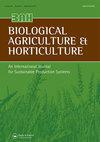Chemical and biological indicators of soil quality in organic and conventional Japanese plum orchards
IF 1.6
4区 农林科学
Q3 AGRONOMY
引用次数: 2
Abstract
ABSTRACT To evaluate the effect of the management system on soil quality, chemical and biological properties were measured in soils (0–20 cm depth) from Japanese plum orchards managed under organic and conventional conditions. The experiment was conducted between 2005 and 2014 in orchards established at the agricultural research station at Alcalá del Río, Seville, Spain. Overall, the soil chemical parameters in the organic orchard showed higher concentrations of soil organic matter, total N, available P and Mg. There was a trend of higher concentrations of K and Na, though for these elements the differences were significant only in two and one years, respectively. Similarly, concentrations of Mn and Zn tended to be higher in the organic plots, whereas contradictory trends were shown for Fe and Cu. No differences were found between the treatments for other physicochemical parameters such as pH and electrical conductivity. Regarding soil biological properties, the organic system was characterised with a significantly greater abundance of bacteria and fungi compared with the conventional system. The rhizobia population and the legume biomass were also higher in the organic orchard and the plants had more nodules. Likewise, the number of earthworms was higher in the organic system. The results showed that long-term organic management, including the use of cover crops and compost, resulted in a significant shift of the chemical and biological characteristics of the soil compared with the conventional management practice, thus improving soil quality and suggesting that organic farming may provide a potential solution to achieve sustainable agricultural systems.有机与常规日本梅园土壤质量的化学与生物指标
摘要为评价管理制度对土壤质量的影响,测定了有机管理和常规管理下日本梅园0 ~ 20 cm土壤的化学和生物特性。该实验于2005年至2014年在西班牙塞维利亚alcal del Río农业研究站建立的果园中进行。总体而言,有机果园土壤化学参数表现为土壤有机质、全氮、速效磷和Mg浓度较高。K和Na的浓度有升高的趋势,但这两种元素的差异仅在2年和1年内显著。同样,有机土壤中锰和锌的浓度也趋于较高,而铁和铜的浓度则呈现相反的趋势。其他理化参数如pH和电导率在处理间无差异。在土壤生物学特性方面,有机系统的特点是与传统系统相比,细菌和真菌的丰度显著增加。有机果园中根瘤菌数量和豆科植物生物量也较高,根瘤数量较多。同样,蚯蚓的数量在有机系统中较高。结果表明,与常规管理相比,长期有机管理(包括覆盖作物和堆肥的使用)导致土壤化学和生物特性发生了显著变化,从而改善了土壤质量,表明有机农业可能为实现可持续农业系统提供了潜在的解决方案。
本文章由计算机程序翻译,如有差异,请以英文原文为准。
求助全文
约1分钟内获得全文
求助全文
来源期刊
CiteScore
3.30
自引率
6.70%
发文量
18
审稿时长
>36 weeks
期刊介绍:
Biological Agriculture & Horticulture aims to act as the central focus for a wide range of studies into alternative systems of husbandry, and particularly the biological or organic approach to food production. The Journal publishes work of a sound scientific or economic nature related to any aspect of biological husbandry in agriculture, horticulture and forestry in both temperate and tropical conditions, including energy and water utilization, and environmental impact.

 求助内容:
求助内容: 应助结果提醒方式:
应助结果提醒方式:


